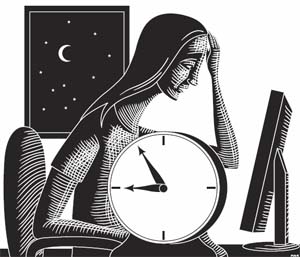
Source: fitness.makeupandbeauty.com
Shift work (SW) means a group of workers alternating with other groups in the workplace, working in a rotation through 24 hours in a day. It is required in some industries due to a demand supply need of 7 days a week and 365 days a year work force. There are commonly two or three shift schedules, at 8 hourly or 12 hourly rotations alternating with rest periods. Understanding shift work is important because it has effects on schedules, staffing needs, and workloads, in terms of maintaining productivity, quality and the morale of the workers.
The main effect to health from shift work is the requirement to work during the normal human rest period from 9pm to 5am. The biological clock of the body resets itself during this period and work disrupts the circadian rhythm of normal wake – sleep cycle of the human body. This can then cause the worker to be awake during the next sleep, and then want to fall asleep during the next shift, due to inadequate rest.
Stress and fatigue can result from working during shift work, because the body has to adjust between night and day. This is one of the mental health issues due to shift work. It is also sometimes known as shift lag. The workers become irritable, easily annoyed, suffer from lack of concentration and may be easily angered. These can cause accidents to occur in the workplace.
Workers on shift also suffer from fatigue. Workers feel very ‘tired out’ and lack motivation to do their day to day normal activities. It is like being depleted of strength. Gastric problems like feeling bloated, ‘fullness’ and sometimes pain in the stomach (gastritis) can also occur. In the long term, it may lower immunity and workers may fall ill easily.
Another aspect of shift work is disruption in social and family activities. Due to the nature of work and timing, shift work can result in a worker not able to attend family functions, and if both the husband and wife are on different shift, it may put a strain on the family.
So what can the management and workers do to reduce the effects from shift work?
- Plan the schedule to reduce the effects from shift work. It is best to work days, evening and then do the night followed by off days.
- Get ‘quality’ sleep by having adequate rest period, in a comfortable, dark and quiet room and be consistent with the ‘time to sleep’.
- Continue with normal daily activities like exercising, time off for family and adequate nutrition. This will boost your health and immunity.
- Alcohol, coffee/tea, and smoking are to be reduced or avoided altogether.
- Finally, as you send your car in for regular servicing to ensure it is in tip top condition; do the same for yourself to ensure you as a worker too, will be in tip top condition.
Dr. Lim Jac Fang is an occupational health consultant from Sabah with an impressive list of accomplishments and achievements in his field. Find out more at The Team page.
Reference
- LaDou, Joseph, ed. 2006. Current Occupational and Environmental Medicine, 4th ed. New York: McGraw Hill.
[This article belongs to The Malaysian Medical Gazette. Any republication (online or offline) without written permission from The Malaysian Medical Gazette is prohibited.]
